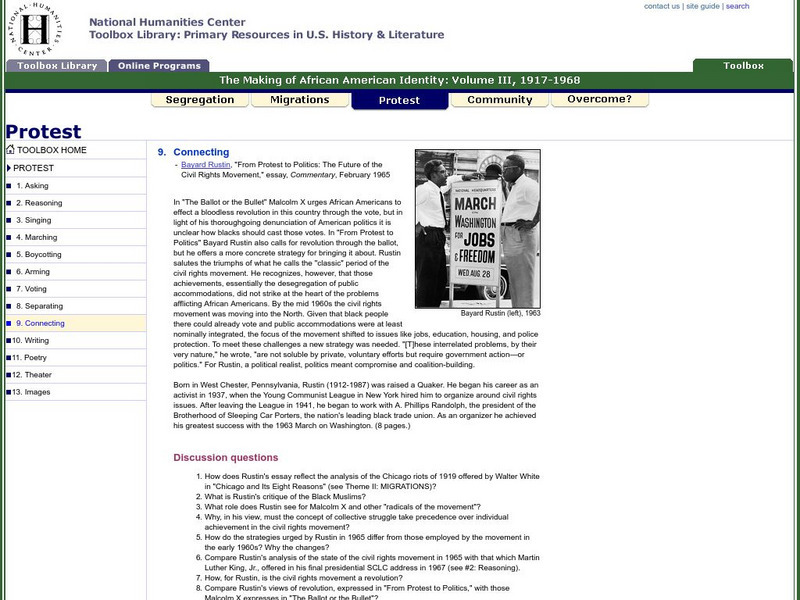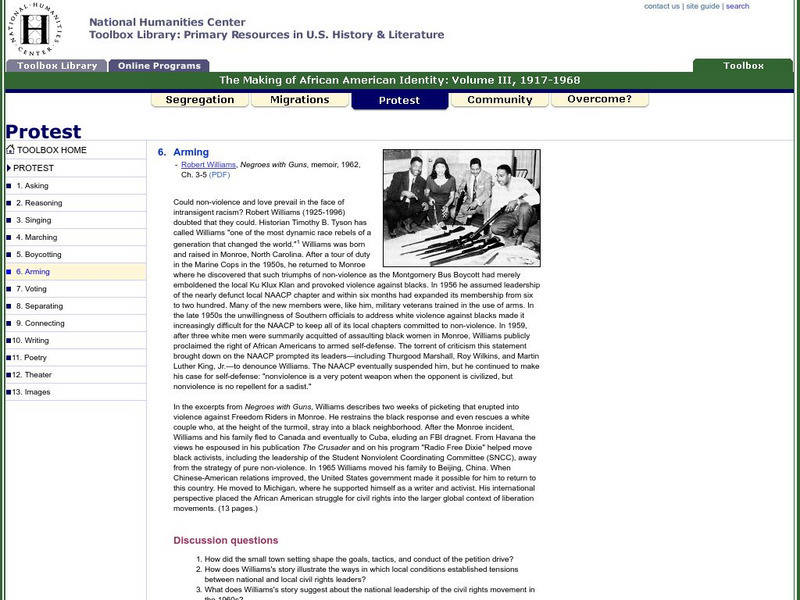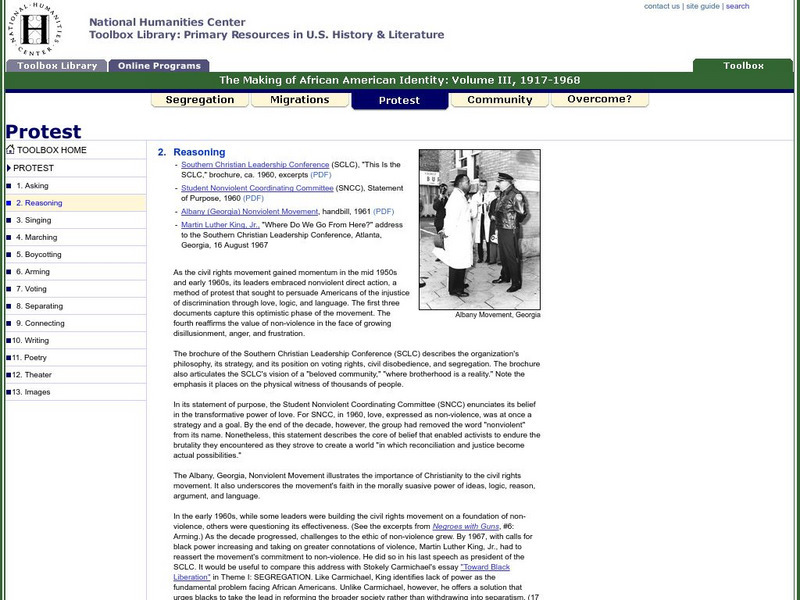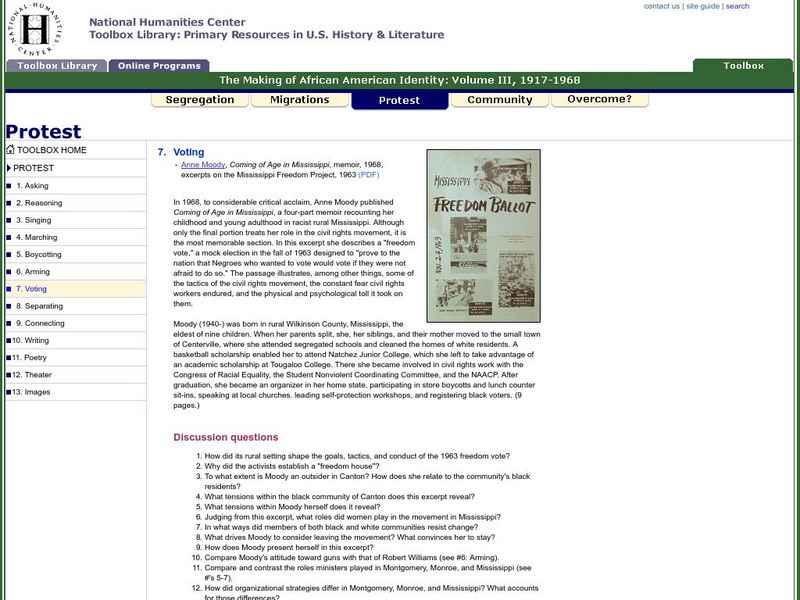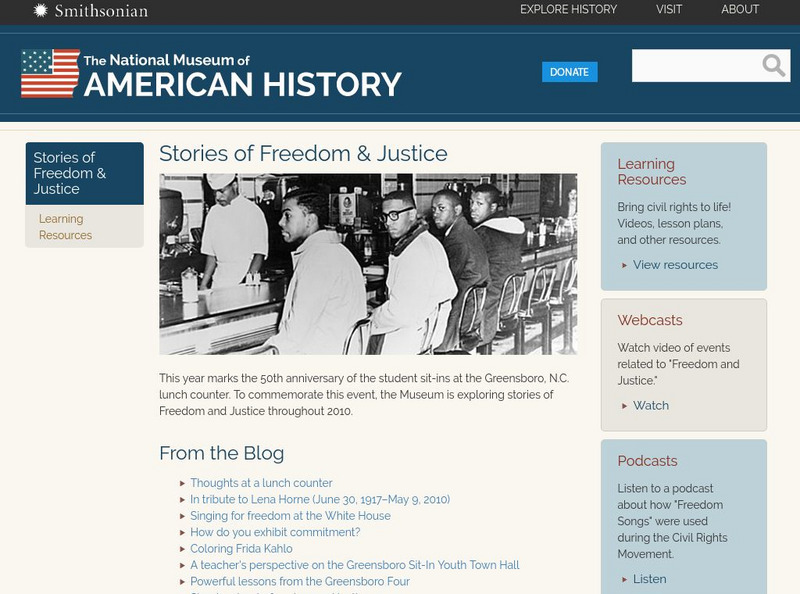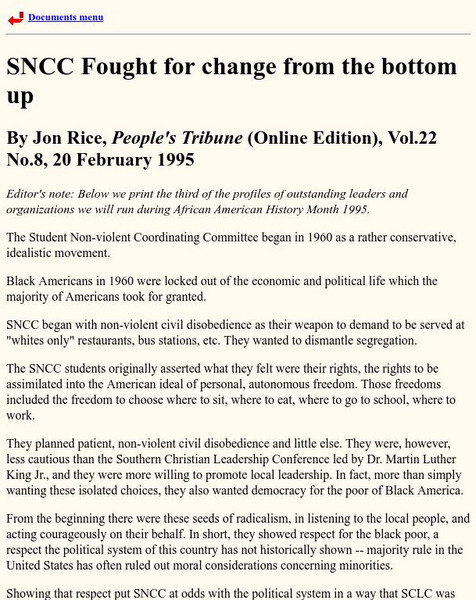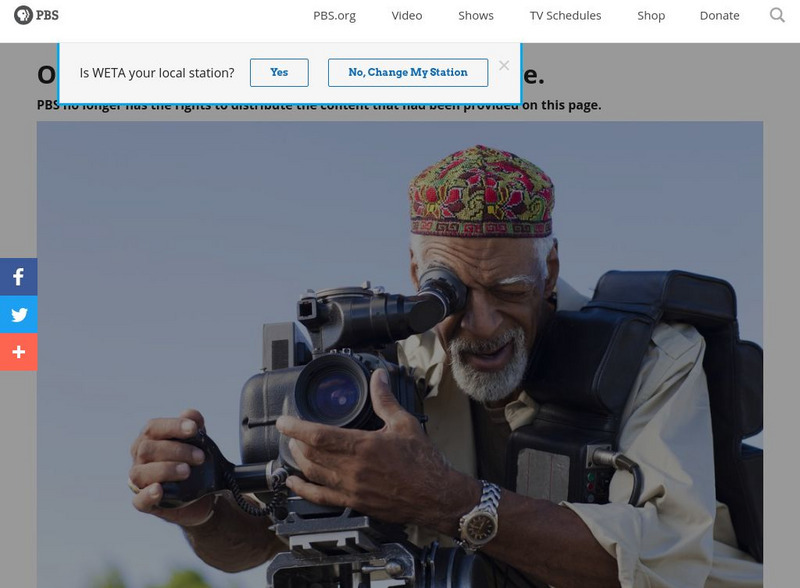Hi, what do you want to do?
Khan Academy
Khan Academy: Us History: 1945 1980: March on Washington for Jobs and Freedom
Read about the 1963 protest that culminated with Dr. Martin Luther King's 'I Have a Dream' speech.
National Humanities Center
National Humanities Center: Toolbox Library: Connecting: Making of African American Identity: V. 3
An article that makes a case for black engagement with the American political system. This resource provides a link to Bayard Rustin's "From Protest to Politics", where he encourages African Americans to begin a "revolution through the...
National Humanities Center
National Humanities Center: Toolbox Library: Theater, Making of African American Identity: V. 3
A manifesto and scenes from a play illustrating black protest in the theater. LeRoi Jones's short manifesto, "The Revolutionary Theatre," and Douglas Turner Ward's, " Day of Absence" encapsulates the mindset of many black writers and...
National Humanities Center
National Humanities Center: Toolbox Library: Arming, Making of African American Identity: V. 3
This resource offers a memoir that examines the role of armed self-defense in the civil rights movement. An excerpt from the text "Negroes with Guns", by Robert Williams is made available here, describing his approach towards civil...
National Humanities Center
National Humanities Center: Toolbox Library: Reasoning, Making of African American Identity: V. 3
Brochures and a speech from the Southern Christian Leadership Conference describing the organization's philosophy, its strategy, and its position on voting rights, civil disobedience, and segregation.
National Humanities Center
National Humanities Center: Toolbox Library: Voting: Making of African American Identity: V. 3
The efforts to secure African American voting rights in Mississippi are described within this resource. Anne Moody's, "Coming of Age in Mississippi", a four-part memoir recounts her childhood and young adulthood in racist rural Mississippi.
Other
Pro Democracy Protests in China
This collection of solicit papers by China specialists and on-the-spot observers of the extraordinary events that exploded across the breadth of China in the spring of 1989 view the prodemocracy movement in the provinces as well as in...
Smithsonian Institution
National Museum of American History: Stories of Freedom and Justice
To celebrate the 50th anniversary of the student sit-ins at the Greensboro, NC. lunch counter, the NAMH has produced this excellent collection of resources centered on the theme of freedom and justice. Experience this important part of...
Siteseen
Siteseen: American Historama: Southern Christian Leadership Conference (Sclc)
Detailed facts and a summary on the Southern Christian Leadership Conference (SCLC) formed as a Civil Rights non-violent protest group in 1957.
Other
Labor Arts: Labor Sings
Many songs, born of the American labor and civil rights movements, called people to action and were used to spread the messages of workers' rights and civil rights. Here you will find a nice collection of such songs. All songs in the...
Other
Black Panther Party Photo Tour
This site contains a photo tour of the Black Panther Party and is part of a Bobby Seale web site devoted to the 60s protest movement and current African American struggles. A variety of audio and video clips are available.
Independence Hall Association
U.s. History: Rosa Parks and the Montgomery Bus Boycott
Rosa Parks started a revolution by refusing to give up her seat on a bus. Read about the Montgomery bus boycott, and see how the nonviolent actions of supporters of the Civil Rights movement succeeded in using the boycott to inspire more...
Encyclopedia Britannica
Encyclopedia Britannica: Al Sharpton
Biographical details on Al Sharpton who began preaching at age four and became an ordained Pentecostal minister at age 10. A colorful and popular figure in the African American community, he embarked upon controversial protests that...
National Humanities Center
National Humanities Center: Toolbox Library: Separating: Making of African American Identity: V. 3
Article summarizes and provides links to audio and text versions of a speech made by Malcolm X one month after he left the Nation of Islam over a disagreement with its leader Elijah Muhammad. Includes questions for discussion.
Curated OER
Thousands of People Gathered in Ny, 1963, to Protest the Birmingham Murders.
The tragic story of the Baptist Church bombing in Birmingham during the Civil Rights movement in which four girls were killed. This NPR site updates the saga of the on-going investigation of the murderers.
Hartford Web Publishing
World History Archives: Sncc Fought for Change From the Bottom Up
A highly informative narrative on the development and philosophy of the Student Nonviolent Coordinating Committee, with comparisons to Dr. King's SCLC and the Black Panther Party. Good resource.
Other
Historical Thinking Matters: Rosa Parks: Intro
Extensive teaching aid to help students understand the Montgomery Bus Boycott using primary sources such as letters, police reports, leaflets, and speeches. Includes many student activities and resources.
PBS
Wnet: Thirteen: Freedom: A History of Us: We Shall Overcome Webisode 15
Webisode 15 - We Shall Overcome. The history of the United States is presented in a series of webisodes, within each are a number of segments.Included are links to lesson plans, teacher guides, resources, activities, and tools.
PBS
Pbs: American Roots Music
If teaching a unit about the history of popular music in America, this PBS web site supporting their four-part TV broadcast of a few years ago would make a great resource. Includes lesson plans and oral histories too.
Other
International Museum of Women: Women, Power and Politics
An online museum exhibition organized around nine themes related to women, power and politics. Learn how women around the world have, and are claiming, a place at the political table, what forces have tried to keep them away, and where...
Digital History
Digital History: The Tumultous 1960's
The decade of the 1960s was a time of protest about the Vietnam War and civil rights, and progressive legislation addressing many problems. Find primary source material, charts, and statistics that cover these topics. Included are...
PBS
Alcatraz Is Not an Island: Indian Activisim
Part of a larger PBS site about Altcatraz and the Indian protest movement, this outlines the various AIM and Red Power actions to bring to the front Native American problems and to push for basic civil rights.
Digital History
Digital History: The Native American Power Movement
This Digital History essay provides an excellent summary of the plight of the American Indian and their fight in the civil rights era.
Gilder Lehrman Institute of American History
Gilder Lehrman Institute: History Now: Nonviolent Direct Action at Southern Lunch Counters
[Free Registration/Login Required] A lesson plan that teaches about nonviolence and uses the civil rights lunch counter protests as examples.






